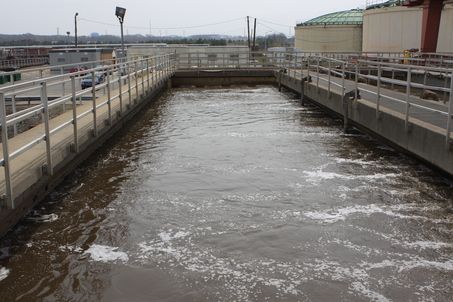Ten Days After Sandy, Millions of Gallons of Raw Sewage Continue To Flow Into NJ Rivers From Knocked Out Sewage Treatment Plants
“EPA has been working very very hard on the sewage treatment plant problems we are [at] the facilities, brought in an epa staffer from texas who worked on dewatering the new orleans potw, etc etc etc” ~~~ High level EPA official (11/6/12)
[Update #1: 11/8/12, 11:45 am) – I noted how DEP was playing catchup, withholding information, and closed this post with a challenge to DEP – Well well! In response, DEP just issued a press release on the Passaic situation. I’ll post it when a link becomes available. end]
Update # 2 12:30 pm – I just read the DEP press release on the Passaic Valley situation closely. According to DEP, raw sewage is no longer being discharged and no Passaic drinking water intakes are impacted by this plant.
But DEP said nothing about: 1) OTHER sewage treatment plants and 2) whether ANY drinking water intakes or drinking water treatment plants have been impacted or shut down.
Why can’t DEP make an unequivocal statement about the statewide situation on these 2 critical issues? – end update]
Last week, after “Superstorm Sandy” hit, I called DEP to ask about loss of power at sewage treatment plants, especially those that discharge to rivers above water supply intakes.
They didn’t return the call.
As we’ve written, water and sewage treatment plant vulnerability to storm surge, flooding, and loss of power is a well known but largely ignored problem, particularly threats to downriver water supply intakes.
I spoke to reporters about the issue to see if they had heard anything – one reporter confirmed that he had spoken confidentially with sewage plant operators and knew there were serious problems, but no one would go on the record and the DEP was not returning his calls.
Well, the Bergen Record broke the story bigtime, forcing DEP’s hand [and Gov. Christie’s, who issued an Executive Order on water conservation the same day – part of what has become a DEP pattern of withholding vital information and then reacting to criticism and crisis.]
Last Thursday, the Bergen Record reported
Disabled North Jersey regional sewage plant dumping untreated waste into Newark Bay
One of the nation’s largest wastewater treatment facilities has been pumping about 300 million gallons of raw sewage into Newark Bay since Monday, and environmental regulators weren’t sure Thursday when the hurricane-disabled plant would resume operations.
The plant run by the Passaic Valley Sewerage Commission, which treats wastewater for more than 20 towns in Bergen and Passaic counties, was socked with damaging floods during the height of Hurricane Sandy on Monday night and doesn’t have the power needed to pump out a series of tunnels that were inundated during the storm, state officials said Thursday.
To get a handle on the statewide scope of the problem, on Monday, our friends at PEER put out the below press release: CASCADING FAILURES THREATEN NEW JERSEY WATER SUPPLIES Abandonment of Climate Preparedness Work Aggravates Garden State’s Plight
Posted on Nov 05, 2012
Trenton — New Jersey is in a race against time to safeguard its supply of drinkable water due to massive amounts of sewage flowing from treatment plants disabled by Hurricane Sandy, according to Public Employees for Environmental Responsibility (PEER). Drinking water intakes on several rivers are under threat from potentially inoperative sewage plants, power blackouts and failing back-up generators.
The state has declared a “water emergency” and issued boil water advisories for several communities due to loss of power at the drinking water plants. Current water use restrictions include bans on watering lawns, ornamental fountains, car and truck washing.
In a press release issued last Friday, the state Department of Environmental Protection (DEP) confirmed that “several waste water treatment facilities in the state are off-line, resulting in the temporary runoff of effluents into certain waterways” but has not provided the number or locations of disabled plants. DEP did list the following water bodies, including major drinking water sources, as contaminated:
“New Jersey portion of the Hudson River, Passaic River, Hackensack River, Newark Bay, Kill Van Kull and Arthur Kill, Raritan Bay, Raritan River, and Sandy Hook Bay”
“With hundreds of millions of gallons of raw sewage pumping into rivers each day, drinking water intakes on these rivers are at risk of shutdown. If these intakes are forced to close, it is unclear how long cities, particularly in northern New Jersey, will be able to supply water to residents,” stated New Jersey PEER Director Bill Wolfe, noting that the absence of information on the status of scores of sewage treatment plants has kept the public in the dark. “Unless these sewage treatment plants are brought back on line we will move from a statewide water emergency to a water catastrophe.”
And what do you know?
DEP is finally starting to fess up!
Today, DEP issued a press release finally admitting that the Middlesex County MUA sewage treatment plant is discharging millions of gallons of raw sewage to the Raritan River:
CUSTOMERS OF MCUA ADVISED TO FURTHER REDUCE WATER USE TO LIMIT POLLUTING RUNOFF INTO RARITAN RIVER AND RARITAN BAY
(12/P139) TRENTON – Residents and businesses in the 38 towns served by the Middlesex County Utilities Authority’s wastewater treatment system are advised to further minimize water use to reduce stress on the storm-damaged sewage treatment system and help limit polluting effluent now flowing into the Raritan River and Raritan Bay.
So, is the problem limited to the Middlesex MUA and Passaic Valley plants?
Or are more plants discharging raw sewage?
Are discharges above water supply intakes? If so, are those intakes shut down? If so, is there adequate water supply?
Will DEP please clarify?
